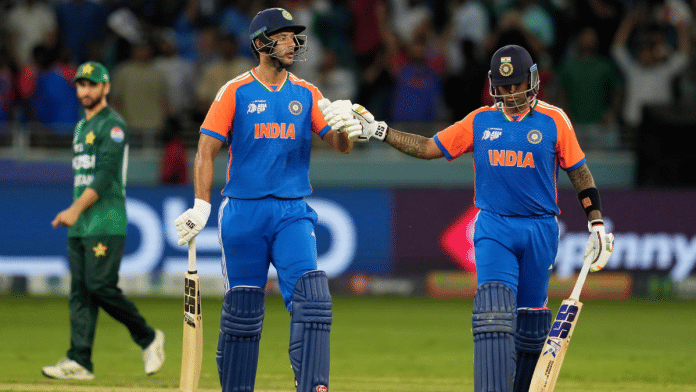Thank you dear subscribers, we are overwhelmed with your response.
Your Turn is a unique section from ThePrint featuring points of view from its subscribers. If you are a subscriber, have a point of view, please send it to us. If not, do subscribe here: https://theprint.in/subscribe/
Cricket in India is more than a sport. It is spectacle, passion, and identity. But it is still a game, not a battlefield. Recent events at the Asia Cup, and the political rhetoric that followed, have blurred this line in troubling ways.
On the field, India’s players displayed a competitiveness that is expected in high-stakes contests. Rivalries in the subcontinent are fierce; emotions often spill over. But refusing to collect the trophy from an internationally appointed official was more than an emotional lapse. It was an act of disregard. A trophy presentation is not a formality. It is the ritual that marks victory with dignity, acknowledges the authority of the organisers, and recognises the traditions of the game. To shun it is to signal disdain for the very principles that hold international sport together. India, as a leading cricketing nation, cannot afford to be seen as dismissive of those values.
The problem deepens when politics echoes such gracelessness. The Prime Minister’s choice to compare “Operation Sindoor” a military offensive marked by blood, sacrifice and national risk to a cricket encounter was ill-judged.
A cricket match may be dramatic. But it is entertainment. A military operation is duty, death and history. Can the sacrifice of martyrs who faced bullets be equated with the emotion of a bat-and-ball contest? To do so trivialises both the seriousness of war and the meaning of sport.
Military metaphors in cricket are not new. Commentators speak of “battles,” “blitzes” and “captains as generals.” Such language is understood as colour, not comparison. But when national leaders draw the same parallels, the consequences are different. They risk turning sport into a proxy for hostility and reducing war into a punchline.
Patriotism does not require theatrics. It does not need cricketers to strut or politicians to boast. True national pride shows itself in restraint, in humility, in the wisdom to know that winning gracefully is as important as winning itself.
India is rightly proud of its sporting stature. But greatness is measured not only by trophies and scorelines, but by conduct. The greatest champions know how to celebrate victory with grace, and how to accept defeat with dignity.
Is it not an insult to martyrs to have their sacrifice compared with a cricket score? Soldiers fight for sovereignty and survival, not applause. Their legacy should be remembered with reverence, not invoked for sporting soundbites.
When cricket is treated as warfare, it breeds more than misplaced pride. It feeds hostility. It encourages people to see neighbours not as competitors but as enemies. It risks transforming a game meant to unite audiences into another fault line of division. For a region already scarred by tension, this is reckless.
India’s civilisational depth and cultural strength give it every reason to be confident without swagger. Its cricketing achievements speak for themselves. But a nation is truly great when it knows how to conduct itself not when it shouts the loudest, but when it acts with the quiet dignity that commands respect.
Sport and war are not equals. One is entertainment, the other is existential. To confuse the two is to diminish both. Cricket may stir passion like little else, but it remains just that a game. War is sacrifice, memory, and national destiny. The two must never be blurred.
Pierre de Coubertin, the founder of the modern Olympic movement, envisioned sport as a noble alternative to war. At a time when Europe was riven with conflict, he believed athletic contests could channel national rivalries into healthy competition rather than bloodshed. For Coubertin, the playing field was meant to replace the battlefield, a space where nations could measure themselves in strength, skill and spirit, without the cost of lives. His philosophy was simple yet profound: sport should elevate humanity, foster respect among rivals, and create peace where politics often fails.
India will be judged not only by how it plays, but by how it carries itself in moments of triumph. Our soldiers deserve reverence. Our cricketers deserve encouragement. Our opponents deserve respect. That balance, not bluster, is the true mark of patriotism.
These pieces are being published as they have been received – they have not been edited/fact-checked by ThePrint.


